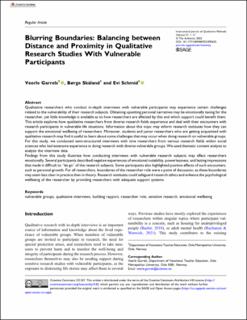| dc.contributor.author | Garrels, Veerle | |
| dc.contributor.author | Skåland, Børge | |
| dc.contributor.author | Schmid, Evi | |
| dc.date.accessioned | 2022-09-16T11:45:54Z | |
| dc.date.available | 2022-09-16T11:45:54Z | |
| dc.date.created | 2022-05-03T12:46:24Z | |
| dc.date.issued | 2022-05-02 | |
| dc.identifier.citation | International Journal of Qualitative Methods (IJQM). 2022, 21 1-11. | en_US |
| dc.identifier.issn | 1609-4069 | |
| dc.identifier.uri | https://hdl.handle.net/11250/3018461 | |
| dc.description.abstract | Qualitative researchers who conduct in-depth interviews with vulnerable participants may experience certain challenges related to the vulnerability of their research subjects. Obtaining upsetting personal narratives may be emotionally taxing for the researcher, yet little knowledge is available as to how researchers are affected by this and which support could benefit them. This article explores how qualitative researchers from diverse research fields experience and deal with their encounters with research participants in vulnerable life situations. Information about this topic may inform research institutes how they can support the emotional wellbeing of researchers. Moreover, students and junior researchers who are getting acquainted with qualitative research may find it useful to learn about some challenges that may occur when doing research on vulnerable groups. For this study, we conducted semi-structured interviews with nine researchers from various research fields within social sciences who had extensive experience in doing research with diverse vulnerable groups. We used thematic content analysis to analyze the interview data. Findings from this study illustrate how conducting interviews with vulnerable research subjects may affect researchers emotionally. Several participants described negative experiences of emotional instability, powerlessness, and lasting impressions that made it difficult to “let go” of the research subjects. Some participants also highlighted positive effects of such encounters, such as personal growth. For all researchers, boundaries of the researcher role were a point of discussion, as these boundaries may seem less clear in practice than in theory. Research institutes could safeguard research ethics and enhance the psychological wellbeing of the researcher by providing researchers with adequate support systems. | en_US |
| dc.language.iso | eng | en_US |
| dc.publisher | SAGE Publications | en_US |
| dc.relation.ispartofseries | International Journal of Qualitative Methods (IJQM);21 | |
| dc.rights | Navngivelse 4.0 Internasjonal | * |
| dc.rights.uri | http://creativecommons.org/licenses/by/4.0/deed.no | * |
| dc.subject | Vulnerable groups | en_US |
| dc.subject | Qualitative interviews | en_US |
| dc.subject | Building rapports | en_US |
| dc.subject | Researcher roles | en_US |
| dc.subject | Sensitive research | en_US |
| dc.subject | Emotional wellbeing | en_US |
| dc.title | Blurring Boundaries: Balancing between Distance and Proximity in Qualitative Research Studies With Vulnerable Participants | en_US |
| dc.type | Peer reviewed | en_US |
| dc.type | Journal article | en_US |
| dc.description.version | publishedVersion | en_US |
| dc.rights.holder | © The Author(s) 2022 | en_US |
| cristin.ispublished | true | |
| cristin.fulltext | original | |
| cristin.qualitycode | 1 | |
| dc.identifier.doi | https://doi.org/10.1177/16094069221095655 | |
| dc.identifier.cristin | 2020951 | |
| dc.source.journal | International Journal of Qualitative Methods (IJQM) | en_US |
| dc.source.volume | 21 | en_US |
| dc.source.issue | 21 | en_US |
| dc.source.pagenumber | 1-11 | en_US |

